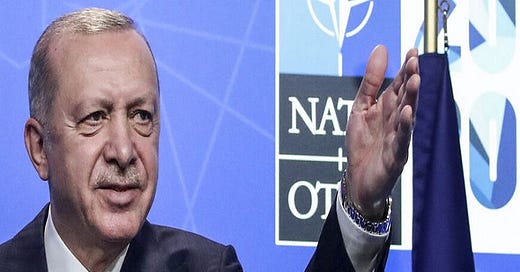It’s Not A Big Deal If Turkiye Indefinitely Delays Sweden’s NATO Bid
Turkiye has nothing to lose by indefinitely delaying that country’s official membership in NATO in exchange for Sweden making tangible progress on helping Ankara ensure its national security interests like President Erdogan has requested. Despite the political blow this would inflict on that bloc’s reputation, its objective military interests wouldn’t be damaged since it’s unrealistic to expect Russia to attack Sweden anyhow, and the US and its allies would likely defend it in that extremely fringe scenario.
Swedish Prime Minister Ulf Kristersson made it clear that his country won’t comply with the rest of Turkiye’s terrorist-related requests that Ankara made conditional for earning its approval of Stockholm’s NATO membership bid. According to remarks that he made at a defense think tank conference last weekend, “Turkey both confirms that we have done what we said we would do, but they also say that they want things that we cannot or do not want to give them.”
Nevertheless, Reuters also reported that Kristersson still expressed confidence that Turkiye will ultimately approve Sweden’s NATO membership bid. He shouldn’t get his hopes up about a possible compromise, however, since Turkish President Recep Tayyip Erdogan has repeatedly signaled that he regards Stockholm’s extradition of alleged terrorists and other issues as an uncompromisable national security priorities. Therein lies the dilemma since Sweden and Turkiye perceive this very differently.
The Swedish Supreme Court blocked the extradition last month of Bulent Kenes, who considers himself a journalist but is accused by his homeland of participating in the failed summer 2016 coup attempt that Ankara alleges was masterminded by US-based Turkish cleric Fethullah Gulen. Turkiye officially designated that individual as a terrorist and describes his followers as the Fethullah Gulen Terrorist Organization, which is also known as FETO. The group allegedly still poses a threat to that country.
Sweden takes a different approach to this issue in particular and Turkiye’s terrorist-related concerns more broadly such as those connected to the “Kurdistan Workers’ Party” (PKK). As proven by its recent Supreme Court ruling, it agrees with Kenes’ self-description as a journalist and not Ankara’s accusation that he’s actually a terrorist. Moreover, supporters of the PKK and its alleged Syrian wing, the “People’s Defense Units” (YPG), still protest freely in Sweden despite Stockholm designating the PKK as terrorists.
These two positions are contradictory to the spirit of June 2022’s trilateral memorandum between Finland, Sweden, and Turkiye where those NATO aspirants pledged that “Finland and Sweden will not provide support to YPG/PYD, and the organization described as FETO in Turkiye.” The nuance that Kristersson seems to be exploiting is that Sweden doesn’t agree with Turkiye’s claim that Kenes is a member of FETO and that allowing PKK-YPG backers to protest even in unauthorized rallies is “support”.
Turkiye’s stance is the exact opposite for the reasons that were earlier explained, which means that it and Sweden appear to now have irreconcilable positions towards these two issues that stand in the way of Ankara approving Stockholm’s NATO membership bid. Absent any further concessions by either, which are unlikely considering Kristersson’s unambiguous statement and President Erdogan’s firm position, Sweden’s dreams of joining that anti-Russian alliance might indefinitely be delayed.
That outcome would be a major political defeat for this bloc since it prematurely trumpeted Sweden’s membership as a fait accompli the same day that it officially submitted its application on 16 May. Neither Stockholm nor NATO’s Washington leaders foresaw that Ankara would take advantage of this opportunity to advance its national security interests in exchange for supporting that country’s bid. Even then, most Western observers didn’t realize how serious Turkiye regarded its requests as being.
A large part of President Erdogan’s reputation has been built on his reputation as a no-nonsense national security figure who’ll never compromise in the face of threats to his country like those that his government believes are embodied by FETO, the PKK, and the YPG. Ahead of general elections that are expected sometime at the end of this spring, there’s absolutely no way that he can retain the support of his base if he reverses his stance by approving Sweden’s NATO bid after it defied his country’s requests.
Turkiye has nothing to lose by indefinitely delaying that country’s official membership in NATO in exchange for Sweden making tangible progress on helping Ankara ensure its national security interests like President Erdogan has requested. Despite the political blow this would inflict on that bloc’s reputation, its objective military interests wouldn’t be damaged since it’s unrealistic to expect Russia to attack Sweden anyhow, and the US and its allies would likely defend it in that extremely fringe scenario.
That prediction is predicated on the US signing a security deal with Sweden in mid-October that’s meant to protect its borders prior to that country joining NATO. Shortly thereafter, NATO Secretary-General Jens Stoltenberg confirmed that “it is inconceivable that allies would not act should Sweden and Finland come under any form of pressure.” Considering these facts as well as Sweden’s already high degree of interoperability with NATO as reported by the bloc’s own website, it doesn’t really need to officially join.
Sweden is practically an unofficial member of NATO as it is and has been for quite some time already, lacking only formal mutual defense guarantees prior to Stoltenberg de facto extending such during his earlier cited news conference, which in any case aren’t needed since Russia isn’t going to attack it. All of this being the case, it’s actually not a big deal if Turkiye indefinitely delays Sweden’s NATO bid, though the bloc’s reputation will surely suffer because of it.




